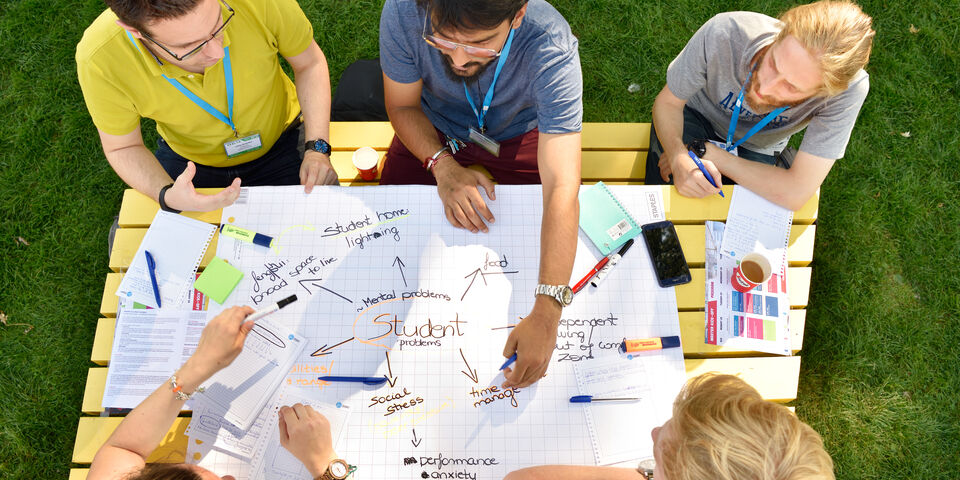Serious challenges for new Masters
After the massive Intro for prospective Bachelor students it is time for the more modest introduction of the new Master students. A central item of the Master Kick-off was the Grand Challenge, in which the 360 participants (including some seventy percent ‘international’) within two days had to come up with solutions to problems within the Eindhoven themes of Health, Energy and Smart Mobility.
The Master Kick-off, which had for the first time been entirely separated from the introduction for the Bachelor students, is of a more serious tone than the Intro. Illustrative of this is the Grand Challenge, in which the Master students in groups of six from different departments had to get cracking on assignments formulated by Eindhoven student teams.
A sizeable part of Tuesday and Wednesday was reserved for this. The three best groups per theme were allowed to present their ideas live (in the form of a digital presentation) in one of the lecture halls of the Auditorium late on Wednesday afternoon. In the evening during the barbecue the four winning groups were announced (one per theme plus the SURE Innovation Award).
Mental health
The Health Challenge had been organized by the students of Living Lab Home, who next year want to set up a student dwelling on the TU/e campus within one day. On behalf of this team Antoine Post, a student of Applied Physics, manned the ‘expert booth’ which due to the wet weather on Wednesday had to be moved from a tent on the KOE lawn to the hall of the Auditorium.
Post says that his student team focuses in particular on the sustainable nature of its experimental dwelling. “That is why this challenge is a great opportunity for us to pick up a number of good ideas.” The question that was phrased was how you can promote students’ mental health in a smart dwelling.
The winning idea was sent in by team 40. This team had devised a system which determines on the basis of both facial expression (through automatic visual recognition) and speech (tone, volume, speed) what the occupant’s mood is like, and subsequently attunes things like lighting and background music to that.
The extra prize, a balloon flight made available by SURE Innovation, was also awarded within the Health category. Team 41 inspired the jury with its Smart Bedroom for Students, equipped with all kinds of clever gadgets intended to contribute to a better night’s rest. Waking up pleasantly with slowly opening curtains, a pillow that prevents snoring and a mattress which automatically adjusts its temperature – to name just a few examples from a long list of ideas presented by this inventive team.
E-campus
The Energy Challenge was organized by Team Energy. The students who had been grouped for this challenge had to think of a way to convert the present TU/e site into a sustainable campus. Titus Kervezee, prospective chairman of Team Energy, did not nourish any great expectations just before the deadline on Wednesday.
“The preliminary entries we received yesterday were rather mundane. I hope that we shall see some unexpected ideas after all.” Expected or not: team 46 ended up as the winner in this category with its E-campus. In a nutshell: study and work you can do from your home, so there is no more need for a campus. This would make the buildings available to be used as labs, while the remaining space may be used for ‘green’ initiatives.
Vulnerable pedestrians
How can autonomous vehicles communicate with vulnerable pedestrians on a ‘smart campus’? That was the central question in the assignment within the theme of Smart Mobility. The supervision was in the hands of the ATeam, which is involved in autonomous driving.
The winning concept came from team 3. It had devised the Spectrum Link, a Wi-Fi-based technology, linked to the pedestrian’s smartphone. Lighting at street level (red, white or green) subsequently indicates where and when it is safe to cross the road.
The winners are invited to visit the TU/e Innovation Space, where they will be shown round by Tom Selten, team manager of Solar Team Eindhoven in 2015. Not only will he tell them the story behind the solar-powered car Stella Lux, but he is also going to see whether there is a possibility for the winning ideas to be elaborated further within the Innovation Space.


Discussion